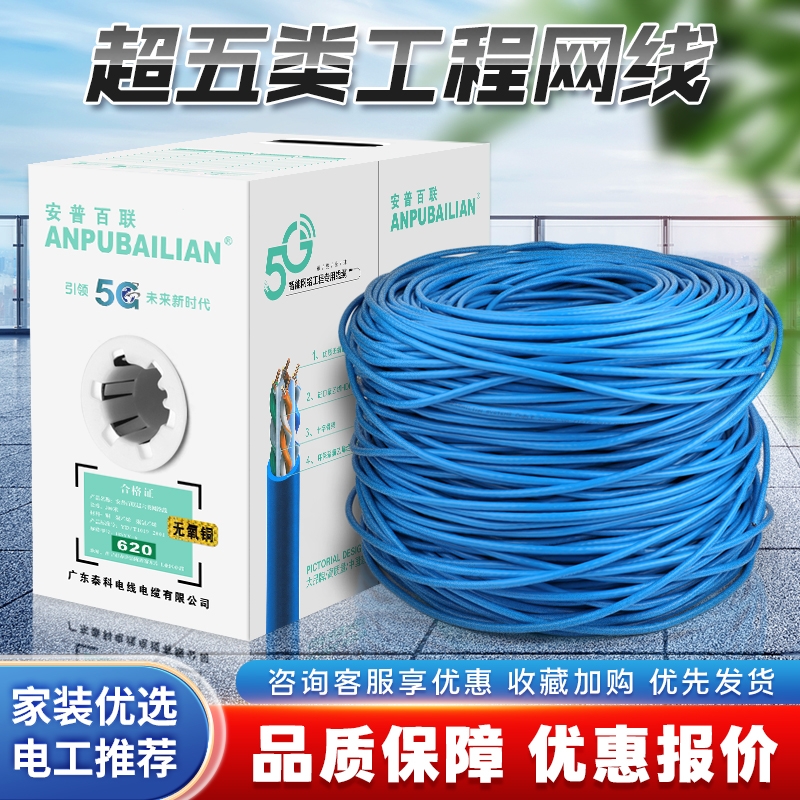“网线质量大揭秘:如何挑选优质的网线?”
观想沮
2024-10-16 11:00:50
0次
**网线质量大揭秘:如何挑选优质的网线?**
在当今数字化的时代,网线作为网络连接的基石,其质量对于网络性能和稳定性至关重要。因此,了解如何挑选优质的网线,对于保障网络通畅、高效运行具有十分重要的意义。下面,我们就来探讨一下如何挑选优质的网线。
一、网线材质的选择
网线的质量首先取决于其材质。优质的网线通常采用纯铜线材,这种线材导电性能好,能有效减少信号衰减。而劣质网线则可能使用含杂质较多的铜包铝线材,这不仅影响传输速度,还可能导致网络连接不稳定。 二、网线结构的考量 除了材质外,网线的结构也是决定其质量的重要因素。优质网线通常采用优质的材料和编织工艺,使线缆更加坚韧、耐弯折。而劣质网线在结构上可能偷工减料,导致线缆容易断裂或损坏。 三、品牌与认证的识别 选择知名品牌和经过认证的网线是确保质量的重要保障。知名品牌通常有严格的生产工艺和质量控制体系,其产品经过了国际或国家标准的认证,具有良好的兼容性和稳定性。而一些无证或不知名品牌的网线可能存在质量不过关、安全无保障等问题。 四、实际需求的考量 在挑选网线时,还需要根据实际需求进行选择。例如,如果需要长距离传输或高带宽需求,应选择具有更高传输速率的网线;如果是在恶劣环境下使用,应选择具有较好抗干扰性和耐久性的网线。 综上所述,挑选优质的网线需要从材质、结构、品牌与认证以及实际需求等多方面进行综合考量。下面我们将上述内容翻译为英文: How to Choose High-Quality Network Cables? In today's digital era, network cables, as the foundation of network connections, are crucial for network performance and stability. Therefore, understanding how to choose high-quality network cables is of great significance for ensuring smooth and efficient network operation. Here, we will explore how to select high-quality network cables. Firstly, the material of the network cable is crucial. High-quality network cables usually adopt pure copper wire material, which has good electrical conductivity and can effectively reduce signal attenuation. In contrast, inferior network cables may use copper-clad aluminum wire material with more impurities, which not only affects transmission speed but also leads to unstable network connections. Secondly, the structure of the network cable is also an important factor determining its quality. High-quality network cables usually use high-quality materials and weaving processes to make the cable more sturdy and resistant to bending. In contrast, inferior network cables may use shortcuts in their structure, resulting in cables that are easily broken or damaged. Thirdly, choosing well-known brands and certified network cables is an important guarantee for quality. Well-known brands usually have strict production processes and quality control systems, and their products have passed international or national standards certification, with good compatibility and stability. Some unlicensed or unknown brands of network cables may have quality problems and lack safety guarantees. Lastly, when selecting a network cable, it is necessary to consider actual needs. For example, if long-distance transmission or high bandwidth requirements are needed, a network cable with a higher transmission rate should be chosen; if it is used in a harsh environment, a network cable with better anti-interference and durability should be selected. In summary, choosing high-quality network cables requires comprehensive consideration of various aspects such as material, structure, brand and certification, as well as actual needs.相关内容
热门资讯
网线故障排查与修复技巧
本文介绍了网线故障的排查与修复技巧,包括测试网络连接、检查物理连接、使用工具检测等排查方法,以及更换...
网线故障排查与解决方法:让网络...
本文介绍了网线故障排查与解决方法,包括物理检查、连接设备及网络设备状态等方面,针对常见故障如网络不稳...
网线的历史与发展趋势
网线历史悠久,从电话线到光纤,逐渐发展成高速、高带宽的数据传输工具。未来趋势包括高速、高带宽、光纤到...
千兆网络、万兆网络与网线的选择...
摘要:选择适合的网线是确保网络速度和效率的关键,根据网络速度需求选择Cat 5e、Cat 6或Cat...
“解析网线传输速度与距离的关系...
网线传输速度与距离关系受多种因素影响,包括网线类型、信号衰减、干扰和噪声等。较远的传输距离可能导致信...
网线故障排查:网络产品连接不畅...
本文介绍了网线故障排查及网络产品连接不畅的解决方法,包括检查物理连接、测试网线通断、重启网络设备等步...
网线的种类与用途:你了解多少?
本文介绍了网线的种类与用途。包括屏蔽网线、非屏蔽网线、光纤网线和同轴电缆,各有不同应用场景。屏蔽网线...
网线与网络产品的兼容性:如何确...
本文讨论了如何确保网线与网络产品的兼容性及性能。选择合适网线,了解产品兼容性,正确安装连接,配置调试...
网线的长度与速度:你需要知道的...
本文详细介绍了网线长度与速度的关系,指出长度对网络体验的重要性。还提到了如何优化网线长度提高速度,以...
网线连接技巧:如何正确连接两个...
文章摘要:本文介绍了连接两个网络设备的技巧和步骤,包括准备工具和材料、连接步骤及注意事项。需确保网线...



